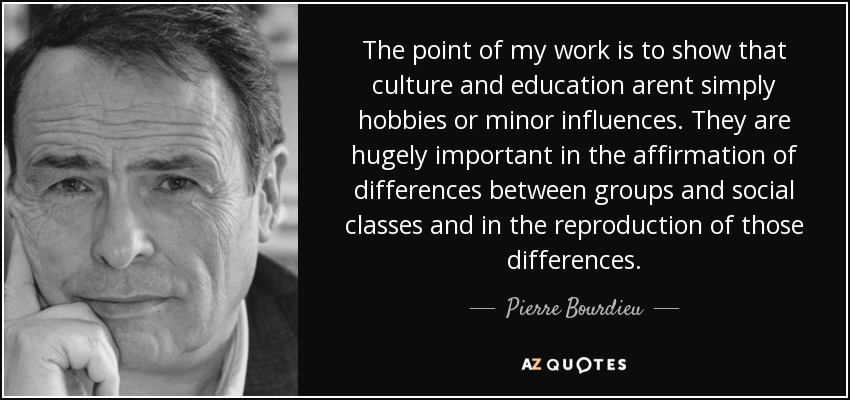布迪厄读书会01-A Glance at Bourdieu
(封面来源)
皮埃尔·布迪厄(1930-2002)是最著名的社会学家之一。他持续用批判性的眼光审视教育制度、社会制度和社会结构,并持续致力于阐明社会不平等的出现、再生产机制,尝试解读各个社会阶层、场域之间的关系。他的著作繁多,从艺术到科学,从经济到文学,从大众生活到学术领域,这些著作大多读起来晦涩难懂,在Michael Burawoy教授在UC Berkeley开设的Introducing Pierre Bourdieu中说”He was rugby player, so tackling Bourdieu is difficult”,”his writing is often arcane and inaccessible”, “his books are frustrating incomplete, and replete with multiple digressions”,并使用了grapple with Bourdieu’s work来形容其课程。我曾经阅读过布迪厄的《再生产》与《国家精英》二书,并匆匆浏览了《区分》、《学术人》两部著作,零碎的阅读体验中,深感阅读之难,却也因此埋下了了解布迪厄理论的种子。
2022年4月,Peer研究院小伙伴转发了一个介绍布迪厄理论的讲座,大家提出想要发起一个关于布迪厄的共学,我主动请缨成为了组织者。挠头准备共学内容的时候在网上找到了UC Berkeley的课程,基本成为了接下来具体的共学计划。在这个计划中,我们将从introduction开始,而后了解布迪厄写作的三大主题,后续将按照作品发表时序进行重要文本选读。而为了真正让自己养成写作的习惯,持续整理学习到的内容,我也将持续更新每一次的阅读笔记。
此为第一期。
布迪厄共学 第一期
共学计划:
- 必读内容:
- a. Introduction: Bourdieu & Social Theory in Bourdieu Critical Perspectives P1-13
- b. Pierre Bourdieu by Wacquant in Key Sociological Thinkers P261-277
- c. Bourdieu meets Bourdieu by Michael Burowoy in Conversations with Bourdieu
- 选读内容:
- d. Making Sense of Bourdieu by Michael Burowoy
- e. The Oxford Handbook of Bourdieu
- f. The Legacy of Pierre Bourdieu
- g. Bourdieu and Historical Analysis
- 实际阅读:a, b, c, d
第一次阅读,主要目的在于大概了解布迪厄的理论、重要的思想和概念,以及,为后续的阅读提出很多很多的问题。
这些文本的挑选来源依据包括:1.社会理论大缸的推文;2.研究布迪厄理论较为出名的Wacquant和Burowoy。这些文本中谈到了布迪厄对于实践practice与反思reflexive的强调,解释了惯习habitus、场域field、资本capital等关键的概念,总结了其在作品中对于阶级class和分层classification,以及区分distinction等的讨论。本文将从中选择三个关键方面进行介绍:1.subjectivism和objectivism的统合:文中认为布迪厄是anti-dualistic的,那么他是如何解释这种主观与客观的dualistic,又为何认为二者可以统合?2.惯习、场域和资本:三个布迪厄最为重要的概念,基本定义是什么,之间的关系是什么;3.一种基于反思reflexive的社会学:布迪厄所谓的反思社会学到底是什么,为什么是反思社会学?
subjectivism与objectivism的统合
Wacquant(2008)在文中认为布迪厄的理论是”a science of practice and a critique of domination”,其中总结的第一个特点就是”anti-dualistic”:
between subjectivist and objectivist modes of theorizing, between the material and symbolic dimensions of social life, as well as between interpretation and explanation, synchrony and diachrony, and micro-and macro-levels of analysis (Wacquant, 2008)
从某种意义上说,他的观点是对于传统经典社会理论的一种批判(a critique of classical social theory, Moishe Postone, Edward LiPuma, &Craig Calhoun, 1993)。传统的社会学理论明显分为两个派别,一个派别支持客观主义(objectivism),认为个体的思想和行动背后由经济条件、社会结构和文化决定,而主观主义(subjectivism)则认为人们根据自己的思想来行动并改造世界。
但是布迪厄认为”Neither of these positions can adequately grasp social life”, 在他眼中,社会生活(social life)是收到客观物质、社会、文化结构所影响的同事又是与个体或者群体的实践与具体经历有关的。
social life must be understood in terms that do justice both to objective material, social and cultural structures and to the constituting practices and experiences of individuals and groups.(Moishe Postone, Edward LiPuma, &Craig Calhoun, 1993)
实际上,布迪厄的惯习、场域、资本等概念无一不映照出他的这一基本观点,比如惯习:惯习或许会由场域中的社会结构等影响而形成,却最终会成为个体具身化的体现,由个体在实践中具体去构建,个体惯习的形成进而又会影响社会结构本身。
惯习Habitus、场域Field、资本Capital
惯习、场域和资本是布迪厄最重要的三个概念,对于三个概念的解释也出现在了每一份导读文本之中。我们先来看一下各个文本对于各个概念的定义(#todo 后续阅读关注布迪厄本人对于三个概念的解释)
三个概念
- Habitus 惯习
- the capacity for structured improvisation, a system of general generative schemes. Habitus is durable and transposable, both objective and subjective. It’s the dynamic intersection of structure and action, society and the individual. It’s the behaviour of agents - objectively coordinated, not the product of rules; or conscious rationality. (Moishe Postone, Edward LiPuma, &Craig Calhoun, 1993)
- the system of durable and transposable dispositions through which we perceive, judge and act in the world. It is acquired through lasting exposure to particular social conditions and conditionings, via the internalization of external constraints and possiblities. It’s the interaction of past influences and present stimuli. The habitus is structured and structuring. It’s the product of structure, producer of practice, and reproducer of structure. It’s ‘unchosen principle of all choices’, or ‘the practice-unifying and practice- generating principle’ that permits ‘regulated improvisation’ and the ‘conductorless orchestration’ of conduct.(Wacquant, 2008)
文中说惯习的概念超越了关于实践是被建构的还是主动建构的这一二元对立的论述(Moishe Postone, Edward LiPuma, &Craig Calhoun, 1993),因而概念中提到了诸多”objective and subjective”, “interaction of structure and action, society and the individual”等概念,这一论述在第二段定义中被表述为 “the habitus is structured and structuring, it’s the product of structure, producer of practice, and reproducer of structure”,那么到底应该如何理解这一概念呢?
在我看来,这里面强调了个体与社会的相互塑造的互动关系,而惯习成为了这一互动关系的中介。在第二个定义中,讲到惯习的获得,它说”it is acquired through lasting exposure to particular social conditions and conditionings”,惯习本身的习得并非是个体从无到有的创造,或者突然的心血来潮,而是来自于特定社会条件和调节作用的长期影响,所以它不是improvisation, 而是”structured improvisation”,这一structured,蕴含的便是社会结构在个体身上的投射。但同时惯习又是一个具身化embodied的概念,会实际地影响个体的行动,在这个意义上它成为了一个从属于个体individual/agent的概念,所以定义一种会说”it’s the behavior of agents - objectively coordinated, not the product of rules”,虽然受到社会的影响,但是它确实属于个体的,同样社会情境下的个体的关系也会有所不同。而其习惯化的特征最后造就其成为了个体的某种行为准则——“it’s unchosen principle of all choices, or the practice-unifying and practice-generating principle that permite regulated improvisation and the conductorless orchestration of conduct”。从社会结构到惯习,再到实践,实践对于社会结构施以影响,最后构成了一个闭环 “it’s the product of structure, producer of practice, and reproducer of structure”。
- Field 场域
- each field is the site of struggles - within field, or over the power to define a field (Moishe Postone, Edward LiPuma, &Craig Calhoun, 1993)
- a structured space of positions, a force field that imposes its specific determinations upon all those who enter it(Wacquant, 2008)
- battle field: an arena of struggle through which agents and institutions seek to preserve or overturn the existing distribution of capital
- degree of autonomy: the capacity it has gained, in the course of its developemnt, to insulate itself from external influences and to uphold its own criteria of evaluation over and agianst those of neighboring or intruding fields.
- offers the individual a gamut(范围) of possible stances and moves that she can adopt
第一个文本倾向于强调场域中的struggle - 场域是the site of struggles, 而这个struggle是在场域内的struggle,或者是over the power to define a field的(此处有一些疑问:为什么是define a field,而不是dominate a field)。这一斗争在第二段文本中也有相关定义,而在此struggle是seek to preserve or overturn the existing distribution of capital.
第二个文本则提供了一个更加全面的定义,场域并非物理意义上的场域,而是structured space of positions: 最重要的是其中有诸多的position,而这些position被置入了一个结构之中,而所有进入的人都会受到场域的影响——a force field。从这个角度上来说,布迪厄的理论是否也与涂尔干的理论有些许互动?不同的是他强调了在客观结构中个体对结构施加的影响。
在我看来,场域还具有两个属性:1.是互相嵌套的。存在大场域和大场域中的子场域,学校,学校中的班级,一个组织,组织中的小团体,就属于此例;2.场域中有一套类似的惯习和被场域认可的资本作为通货。
- Capital 资本
- the capacity to exercise control over one’s own future and that of others. a form of power.(Moishe Postone, Edward LiPuma, &Craig Calhoun, 1993)
- any resource effective in a given social arena that enables one to appropriate the specific profits arising out of participation and contest in it.(Wacquant, 2008)
- economic capital: material and financial assets - cultural capital: scarce symbolic goods, skills and titles - social capital: resources accrued by virtue of membership in a group. - symbolic capital: effects of any form of capital when people do not perceive them as such.
对于资本的阐述是布迪厄最为重要的论述,论述本身也得到他本人持续强调和修改,在1986年出版的书中,他的一篇文章The Forms of Capital(Bourdieu, 1986)对于其资本理论做了较为系统的论述。过去的马克思主义者主要强调经济资本,批判教育社会学学者也主要着重论述经济资本与教育再生产的关系。而布迪厄详细区分了经济资本、文化资本和社会资本三种形式的资本,其中文化资本和社会资本具有象征性,成为了一种symbolic capital.
同时,在分类之外,文本中也额外强调了资本对于“未来”,或者对于“斗争”的作用,资本需要能体现出”control over one’s own future and that of others”的能力,需要能够让一个人在特定场域field的struggle之中能够脱颖而出。曾经听说对于程猛老师《读书的料》一书中“底层文化资本”的争议,即先赋性动力、道德化心性品质和学校化的思维,到底能不能算作一种底层的文化资本呢?如果依照文本一的定义,底层文化资本的论述要想站得住脚还需要验证其对于“未来”的预期效应;而遵照文本二的定义,从高考这一场域来论,似乎是能够让读书的料从中胜出的。但此处笔者依然存在一个疑问,资本是否还需要“可传递”的属性呢?这一属性需要在后续文本中探索。
三个概念之间的关系
He conceives of social practice in terms of the relationship between class habitus and current capital as realized within the specific logic of a given field. An agent’s capital is itself the product of the habitus, just as the specificity of a field is an objectified history that embodies the habitus of agents who have operated in that field. The habitus is self-reflexive in that, each time it is animated in practice, it encounters itself both as embodied and as objectified history. (Moishe Postone, Edward LiPuma, &Craig Calhoun, 1993)
- 1.社会实践social practice: 需要放在特定场域逻辑之下the specific logic of a given field,阶级惯习class habitus与当前的资本current capital之间的关系之中来看待。或者换句话来说,一个社会实践的发生,一个具体的社会的行动的执行,是个体或个体所处阶级的惯习,以及个体所具有的资本,在当前这个场域的逻辑之下的产物。
- 2.资本是惯习的产物capital is itself the product of the habitus: 暂时理解为惯习产生了个体的种种社会实践,社会实践才能带来资本的累积和运用
- 3.场域的具体化过程是场域操控者具身化的惯习客观化的过程: 场域的逻辑是由场域操控者的社会实践构筑的,而其具身化的关系则影响了这一社会实践的过程。
- 4.惯习本身具有反思性habitus is self-reflexive, 在实践中,它一方面是具身的,另一方面又是客观化的。
reflexive sociology: 什么是反思社会学
先来看一看如何定义reflexivity:
Reflexivity: the need continually to turn the instruments of social science back upon the sociologist in an effort to better control the distortions introduced in the construction of the object by 3 factors (Wacquant, 2008):
- personal identity of the researcher
- location in the intellectual field
- a contemplative or scholastic stance
recognize the distinction between their own logic of theory and the participants’ logic of practice(Michael Burowoy, 2018)
反思性,就是字面意思——所谓反思社会学,便是在进行社会学研究的时候需要持续性的反思所用到的一切工具(instruments),如此才能更好地控制可能的事实扭曲,这些扭曲可能由研究者的个人特质,他处在智力场域这样一个位置,以及学者的本质所导致。
为什么需要强调reflexive?其实既然有distortions存在,那么想要避免这些可能的误差便是一件理所当然的事情了,但是也可以再来看看文本之中是如何论述这一必要性的:
what constraints bear upon sociologists and how the specific interests they pursue as members of the ‘dominated fraction of the dominant class’ and participants in the ‘intellectual field’ affect the knowledge they produce (Wacquant, 2008)
但是也有人指出,布迪厄提出的反思性本身就存在一些自相矛盾的特质(Burowoy, 2012)。首先,反思性实际上强调”the sociology that we apply to others must equally be applied to ourselves”,但同时Burowoy也指出,布迪厄本身就没有做好这一点,他个人作品某种程度上来说就是一种符号暴力(symbolic violence),过于晦涩的文字就是一种对于读者的区分:
His very writing is a form of symbolic violence, trying to impress upon the readers his own distinction through esoteric references. (Burowoy, 2012)
除了上述内容,其实布迪厄作品中对于教育和社会再生产的具体过程的论述也十分精彩,其中不乏对于符号暴力等的理论塑造,将在后续的阅读中慢慢呈现。
值得一提的是,Burowoy(2018)的文章本是一篇对于此前针对布迪厄理论提出批判的文章的回复,文章中从demolition-recuperation-critique的角度进行了探讨,在理论学习的同时也可以参透理论中的局限性——局限性与适用性,这也是后续的阅读中需要持续去反思的。
参考文献
Bourdieu, P. (1986). The forms of capital. In: Richardson, J., Handbook of Theory and Research for the Sociology of Education. Westport, CT: Greenwood: 241–258.
Loic Wacquant. (2008). Pierre Bourdieu. In Rob Stones (Eds.), Key Sociological Thinkers (2nd edition) (pp. 261-277). NY: Palgrave.
Michael Burowoy. (2012). Sociology as a Combat Sport. In Michael Burowoy, & Karl von Holdt (Eds.), Conversations with Bourdieu (pp. ??-??). Johannesurg: Wits University Press.
Michael Burowoy. (2018). Making Sense of Bourdieu. Catalyst, 2(21), 51-87.
Moishe Postone, Edward LiPuma, & Craig Calhoun. (1993). Introduction: Bourdieu and Social Theory. In Craig Calhoun, Edward LiPuma, & Moishe Postone (Eds.), Bourdieu Critical Perspectives (pp. 11-13). Oxford: Polity Press.






